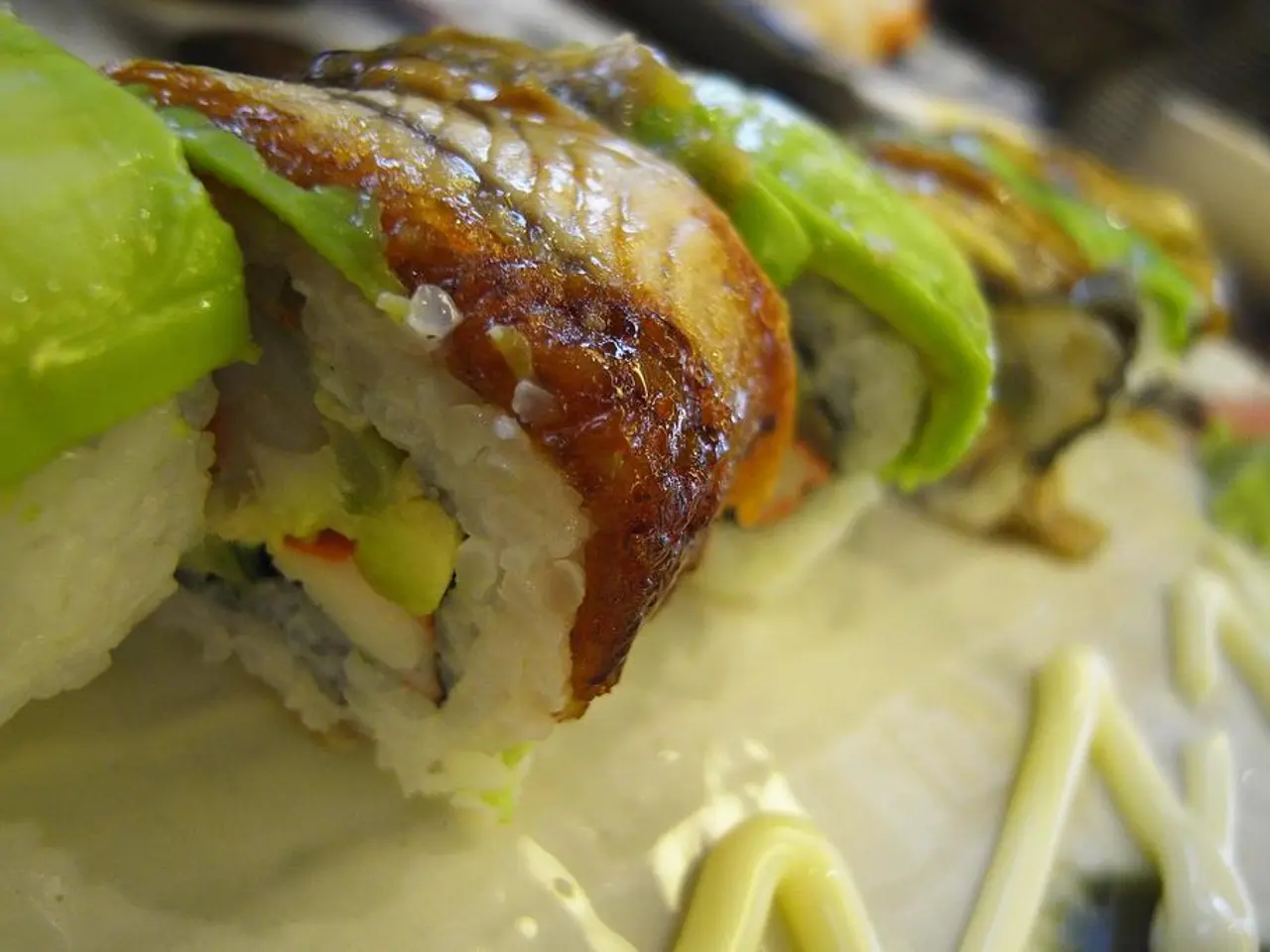Fast-breaking activities: Consuming food, beverages, and energy intake
In the realm of diet and health, fasting has gained popularity as a method to boost metabolic health, support weight loss, and improve cardiovascular health. However, it's essential to understand what beverages are permitted during fasting periods to maintain the benefits and avoid breaking the fast.
When following a modified fasting diet, individuals can consume up to 30% of their daily calorie needs while fasting. This allows for a variety of low-glycemic beverages to keep you hydrated and satisfied.
Approved beverages during fasting include:
- Water: Whether plain, room temperature, cold, or mineral water, this essential hydration source can be enjoyed in various forms to combat monotony during fasting.
- Black coffee: A calorie-free beverage that may even enhance fat metabolism and focus, but caffeine sensitivity should be considered.
- Unsweetened tea: From green tea and matcha (prepared without milk or sweeteners) to hojicha, barley tea, and herbal teas, these options have negligible calories and do not break a fast.
- Unsweetened sparkling water: A refreshing alternative to plain water to add some variety to your fasting beverages.
It's crucial to avoid supplements and beverages that contain calories or affect metabolism during fasting periods. These include:
- Drinks with sugar, milk, juice, alcohol, or any caloric content.
- Soups, even without solids, are best avoided.
- Amino acid supplements such as BCAAs break the fast due to calorie content and metabolic impact.
- Pre-workout supplements containing calories or whole food supplements should only be consumed during eating windows.
Electrolyte balance is vital during fasting, and while some people add a small amount of sea salt to water to maintain hydration and minerals, flavored or calorie-containing electrolyte drinks are discouraged.
Different types of fasting have specific beverage allowances:
- Intermittent fasting (e.g., 16:8, 5:2) allows for water, black coffee, unsweetened tea (including matcha), and unsweetened sparkling water.
- One-day or prolonged fasts primarily involve water, black coffee, unsweetened teas (preferably caffeine-free options for sleep).
- Water-only fasts only permit plain water.
Always consider how specific supplements or beverages affect your blood sugar, insulin, and calorie intake in the context of your fasting goals. If you wish to use supplements or beverages, choose those that are low in calories or do not affect your metabolism.
In conclusion, during fasting periods, it's best to only consume non-caloric beverages such as water, black coffee, and unsweetened tea to maintain fasting benefits and avoid breaking the fast. Supplements or drinks containing calories, including amino acids and pre-workout mixes, should be reserved for eating windows.
[1] Johnstone, A. M., et al. (2017). Alternate-day fasting: An effective dietary intervention for weight loss and cardiovascular disease prevention? American Journal of Clinical Nutrition, 105(5), 1134S–1143S. [2] Harvie, M., et al. (2011). The effects of intermittent or continuous energy restriction on weight loss and metabolic disease risk markers: A randomized trial in young overweight women. International Journal of Obesity, 35(8), 1190–1196. [3] Paoli, A., et al. (2016). Beyond weight loss: a review of the therapeutic uses of very-low-calorie diets. European Journal of Clinical Nutrition, 70(3), 329–336. [4] Varady, K. A., et al. (2017). Short-term modified alternate-day fasting: a novel dietary strategy for weight loss and metabolic improvement in obese adults. Nutrition Journal, 16, 34. [5] Kroeger, C. M., et al. (2018). A systematic review of the effects of intermittent fasting on weight loss and metabolic disease risk markers in adults with obesity: A meta-analysis of randomized controlled trials. Obesity Reviews, 19(6), 682–692.
- While fasting can benefit metabolic health and weight loss, it's important to discern allowed beverages to preserve fasting benefits.
- In a modified fasting diet, low-glycemic beverages like water, black coffee, unsweetened tea, and unsweetened sparkling water are suitable for hydration and satisfaction.
- Drinks with calories, sugar, milk, juice, alcohol, or caloric content, along with soups, amino acid supplements, and pre-workout supplements should be evaded during fasting periods.
- Maintaining electrolyte balance is crucial; while sea salt in water can help, calorie-containing electrolyte drinks are discouraged.
- The types of fasting dictate specific beverage allowances; for example, intermittent fasting allows water, black coffee, unsweetened tea, and unsweetened sparkling water, while water-only fasts only permit plain water.
- When choosing supplements or beverages, consider their impact on blood sugar, insulin, and calorie intake to align with your fasting objectives.
- Low-calorie or non-metabolism-affecting supplements may be suitable if used mindfully within your fasting plan.
- Various studies, including those by Johnstone, Harvie, Paoli, Varady, and Kroeger, support the use of fasting for weight loss and metabolic improvement. However, understanding the appropriate beverages during fasting is essential to fully reap these benefits.




